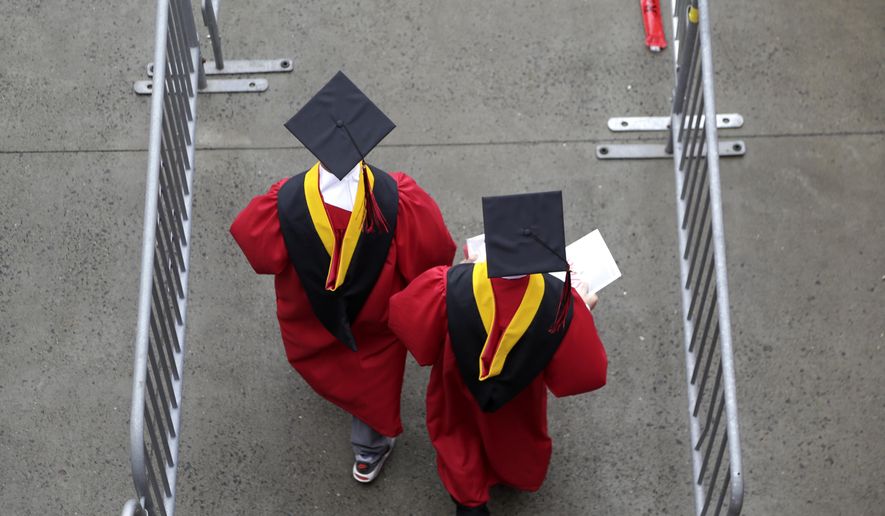The New Working Normal
"Surveys of those entering college almost invariably report that the No.1 reason given for enrolling is to increase their earning potential -- in other words, to become prepared for success in the world of work.""Though that is clearly happening for many, the coddling culture that has grown up at too many schools might actually be setting some young people back instead of readying the, to launch the careers to which they aspire.""That won't produce a workforce built for prosperity -- for any of us."Mitch Daniels, senior adviser, Liberty fund, president emeritus, Purdue University, former governor of Indiana
 |
| Today's students are the least working generation in U.S. history Getty |
The permissive, student-ego-centric as opposed to education-committed public and private education system throughout North America from elementary school on up to college and university has committed itself to the diversity inclusion equity mantra, setting aside the primacy of education for education's sake. Students moving through the elementary school system arrive at institutes of higher education ill equipped through their educational exposure to take their place at college or university when they function at a low level in reading and writing.
This is the material that higher education institutions work with and around, adding their own levels of entitlement to earn degrees even with low academic scores. What has become vital in the education system is awareness of the 'feelings' and 'emotional' safety offered students, where the focus on academics comes second to providing a 'safe' and 'secure' emotional environment for young adults. Their impressions and values are prioritized over the firm academic guidance inherent in motivating students to become educated.
There are plentiful opportunities for employment in today's job market, an estimated ten million available for young graduates in the U.S., the tail end of Millennials and Gen Z members. Exposure to young job applicants with college diplomas ostensibly giving evidence of preparedness for adult job responsibilities has taught employers over a period of recent years that those bearing these diplomas lack a traditional education. They have discovered instead, the unreliability of job seekers to be responsible workers.
That has led greater numbers of employers to rely less on the old requirement of a Bachelor's degree with job applications. Even state governments enlightened to the situation have taken to eliminating these prerequisites in hiring state employees. Some demonstration of relevant job skills, on the other hand has become increasingly valued over a college diploma that no longer is viewed as a guarantee of academic training or readiness for employment.
Qualities as basic as punctuality, the reliability to appear on time for every scheduled workday, an acceptable degree of performance, the sense of responsibility to perform productively and honestly have become the sought-after characteristics for employers in this era of countless job openings. These character traits and learned sets of employment values were once assumed as non-negotiable credits, but are now recognized as traits that cannot be assumed in a job applicant.
Employers now seem to agree with the basic qualities of self-initiative, eagerness to learn, imbued with a solid work ethic, present in a candidate, these standard and required platforms of employee readiness makes them willing to invest in training young new employees. The Wall Street Journal was informed by a Fortune 500 CEO that new hires today possess a totally variant concept of "full time": "Who works 40 hours a week? No one under 35 suddenly does."
 |
| istock |
Businesses have become self-reliant in their own success by the realization that they are required to become often-remedial institutions of higher education themselves. Business spending on training exceeded US$100 billion last year in the United States for the first time, averaging over $1,200 per employee, as a commitment to their own futures as well as that of the employee.
Anxious to acquire productive workers, companies are willing to absorb the burden of skill teaching relevant to their enterprise, as long as they can access new hires with those values considered at one time obvious and given, and now the price of entry for any new job. The current situation was predicted a decade ago when reports emerged quantifying a major drop in industriousness among the prime working-age population.
A team from the Mary Christie Institute, Morning Consult, American Association of Colleges and Universities, the Healthy Minds Network and the National Association of Colleges and Employees conducted a joint survey, finding that close to 40 percent of young professionals, aged 22 to 28 with at least a bachelor's degree claim their college "did not help them develop skills to prepare them for the emotional or behavioural impact of the transition to the workplace".
"If you have an employer where you spend all your time and effort focusing on things that have nothing to do with the business, and you're putting them through DEI training, instead of getting them the training they need to be good at their job - that actually can be demoralizing to people.""What we're hearing over and over again is that young people don't want to work. They simply are a generation that hasn't been hungry, they don't have this desire to work. And so they'll do interviews with people who simply are like, 'Well, I could show up at 10 if that works,' and the employers like, 'How about eight,' and they're like, 'I just don't see that happening.'""They're now getting to that real world. They're getting to an office environment where there's a lot of tension with coworkers, there's an opportunity to get fired or get a demotion, and they're just not ready for it."Andrew Crapuchettes, CEO and founder, RedBalloon.work
 |
Labels: Employer Training Programs, Employment, Graduation, Reliability, Work Ethic, Work Readiness

0 Comments:
Post a Comment
<< Home